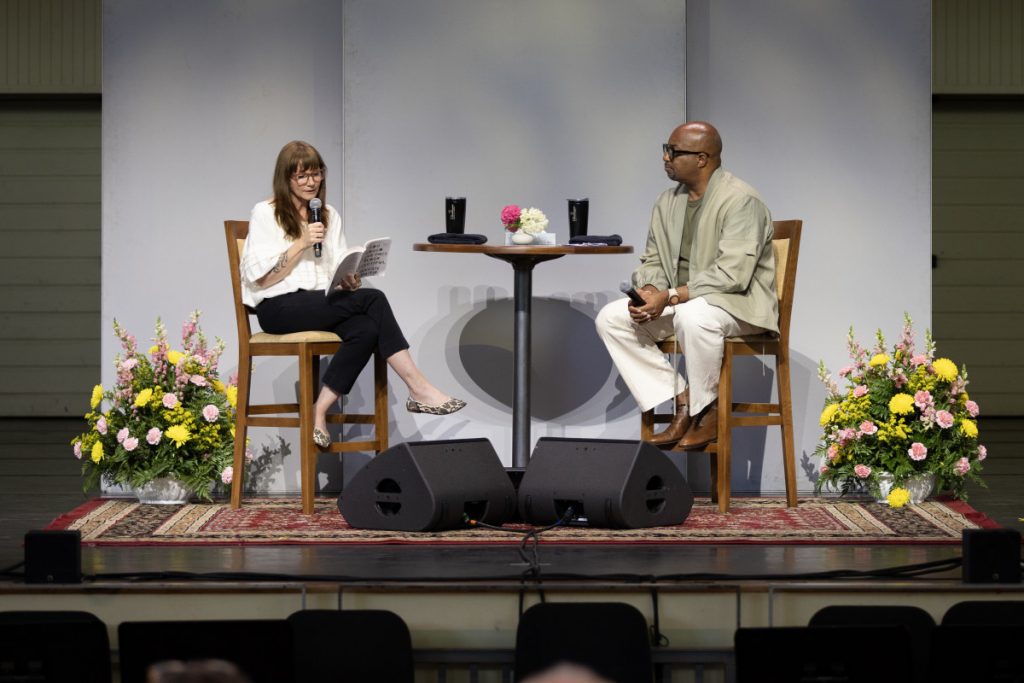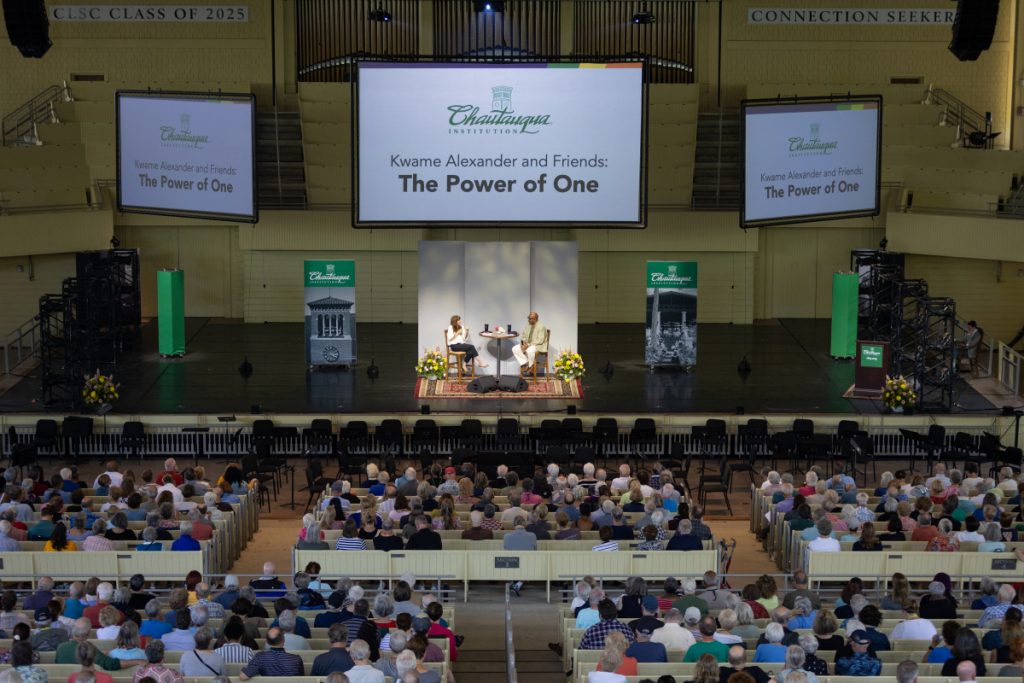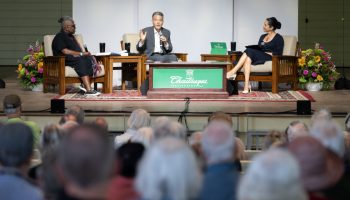
At 10:45 a.m. Monday in the Amphitheater, author Maggie Smith joined Kwame Alexander for Chautauqua Lecture Series’ Week Seven theme, “Kwame Alexander and Friends: The Power of One.”
Smith is a poet and author of seven books. Her poem “Good Bones” won the Gold Medal in Poetry from the 2018 Independent Publisher Book Awards; the viral poem even was quoted in an episode of the CBS show “Madam Secretary.” Her work has also appeared in The New York Times, Tin House, The Believer, The Paris Review, The Kenyon Review and The Best American Poetry, and in 2019, she led a workshop titled “Crafting Free Verse: Line, Syntax, and Stanza,” while in residence at the Chautauqua Writers’ Center.
Alexander is a poet, educator, producer and No. 1 New York Times bestselling author of over 40 books. He currently serves as the Michael I. Rudell Artistic Director of Literary Arts and Inaugural Writer-in-Residence at Chautauqua Institution.
Monday’s conversation began with an examination of Smith’s work, beginning with her New York Times bestselling memoir You Could Make This Place Beautiful.
“There was a little bit of uncomfortableness because the memoir was so good I wished that I had written it,” Alexander said. “It was a master class in how to craft a very personal and vulnerable story with beautiful words. At the same time, it puts all your business in the streets.”
Smith then read her poem “Good Bones,” which reads in part, “Life is short, and I have shortened mine / in a thousand delicious, ill-advised ways, / a thousand deliciously ill-advised ways / I will keep from my children.”
“So life is short, and the world is at least half terrible,” joked Alexander after she finished reading.
Smith explained the poem works with “poem math” — different from actual math.
“Sometimes the math is metaphorical, those days where you feel like it’s 50/50 and could tip in either direction, or frankly, sometimes watching the news, you feel like 50 is very conservative, and it’s 80% bad on any given day,” she said.
The two focused on the use of the word “you” throughout You Could Make This Place Beautiful.
“The title of the memoir, it’s me,” Smith said. “Like, you have got this, you. But I think whenever we hand anything to a reader that has ‘you’ in it, we’re inviting them in. Right? Suddenly, it becomes their book, their story.”
Originally, “Good Bones” wasn’t a favorite of hers. However, it reflected a moment and feeling the world was holding at that time. The 2016 Pulse Nightclub shooting in Orlando happened the same week Smith’s poem was published by an online journal. Just four days later, Jo Cox, a member of the British parliament, was murdered.
The poem went viral shortly afterward.
Smith described the experience as life changing and “completely overwhelming.”
“People who don’t read poetry regularly might find themselves seeking a poem or reading a poem for an occasion. A funeral, a wedding, a graduation. (Poets are) important because they come to us during those times,” she said. “That poem going viral meant a lot of people who didn’t regularly read poetry were passing this thing around.”
The authors flipped the page to then discuss how moments from their upbringing defined the writers they would become.
Smith reflected on growing up as a quieter kid.
“I spent a lot of time in my bedroom listening to music, reading books and doing jigsaw puzzles,” she said.
Smith noted listening to The Clash, The Cure, the Beatles and Neil Young.
Alexander reflected on the music that impacted him growing up, some of his taste coming from his father.
“One day, I was in my father’s attic and discovered a crate of jazz records. I had never listened to jazz,” he said. “… What it did for me, I fell in love with jazz music. But I also fell in love with this man who had never said ‘I love you’ growing up. And so, by discovering my father’s jazz records, I figured he’s probably a cool guy.”
Reflecting on earlier inspirations, Smith noted “The Boxcar Children” as an impactful series growing up.
“That book — the little Benny and the taking bread from the bakery and hiding the milk carton or the milk bottles and the waterfall to keep the milk cool — it was like this adventure of these kids on their own,” Smith said. “… I think about how many children’s books would be flattened if the parents showed up.”
While she spent a lot of time reading as a child, she didn’t discover poetry until she was in high school.
When Alexander decided he wanted to be a poet, not everyone reacted positively.
“There’s a moment in our lives as writers where some of us decide this is going to become more than a vocation,” Alexander said. “This is going to become a job and something I want to do to make a living. I remember getting a lot of pushback from someone.”
Smith never expected to pursue a career as a poet, despite knowing she would always write poems.
“I always tell my agent not to tell people, but I would do this for free. I write poems because I can’t not write poems. What makes me lucky is that writing books is my job,” she said. “I never thought that would be the case.”
Smith described becoming a poet as being “hit by lightning” in the best way.
They then returned to the earlier conversation about Smith’s memoir.
“I don’t think of it as a divorce memoir, although I think that’s good shorthand for it. It’s not really a book about my divorce. But I would say it’s the inciting incident, the thing that triggered me needing, not even wanting to write the book,” Smith said. “No one wants to write that book.”
She described writing the book as being a detective in her own life, looking for what went wrong in her 20-year marriage.
“I describe this book as being an armoire blocking a doorway in a one-doorway room,” Smith said.
Alexander’s memoir Why Fathers Cry at Night garnered stronger reactions from close family members. He didn’t send advance copies or get permission from his family members, only reading what he wrote after the memoir was published. For his family, it was controversial.
“My youngest sister said, ‘I hate the way you wrote about such and such,’ ” Smith said. “My oldest sister said, ‘I’m not reading it.’ There was a lot of anger.”
Since then, he noted having an improved relationship with his family because of the book that had at first angered them. He stated that their relationships have become more authentic.

Smith sent a copy of her memoir to her parents before its release. She recalled her mom saying the book was “fine.” Her father reacted differently.
“He texted me, which was an odd way to respond to someone sending you a book, and said ‘I loved it. It’s a page turner. I couldn’t put it down,’ ” Smith said. “Thanks, Dad.”
Alexander recollected a moment between him and his father, after Terry Gross interviewed Alexander; the interview, in part, was about Alexander’s father.
“I usually call him after interviews. I didn’t call him. And he texted me,” Alexander said. “And he said, ‘When I was in the Air Force, my mother wrote me every week, Kwame. She never said she loved me, but she wrote me every week. My father never said he loved me, but he bought the stamps and the envelope for her each week. One of these days, when you get to this place the old folks call the “by and by,” you will understand how you were loved. Until then, if you need to hear it, I love you.’ ”
Alexander recalled this as the first time he heard those three words from his father.
As the conversation began wrapping up, Alexander surprised Smith, asking her to describe a piece of art she had never seen before. The art is an unnamed piece by Atlanta artist Charly Palmer. Palmer illustrated Alexander’s book How Sweet the Sound.
“I am looking at the way those flowers are sort of covering, but they’re also leaking. That’s how I’m seeing it. Like moving off to the side. So it’s maybe not quite silence,” Smith said. “Maybe it’s a pushback against silence.”
“Really?” Alexander responded.
When Palmer joined them on the stage, he shared what he was considering while creating the piece.
“The work was created during the pandemic, and it was during a time where we would meet people, but you didn’t realize how much your full face tells a story,” he said. “When the nose and mouth are covered, it’s like you’re missing something. And it was a fascinating journey of this idea of a mask and everything.”
He explained the use of flowers in the pandemic-inspired piece as a way life moves on. The lines of disruption are a way of signifying the disruption of the pandemic, according to Palmer.
The conversation concluded with Smith reading the prologue from You Could Make This Place Beautiful.
“There’s no such thing as a tell all, only a tell some, a tell most. This is a tell mine. And the mine keeps changing because I keep changing,” Smith read. “The mine is slippery like that.”




